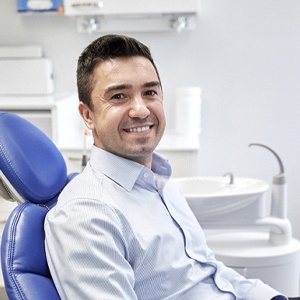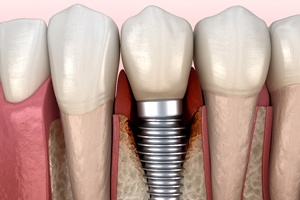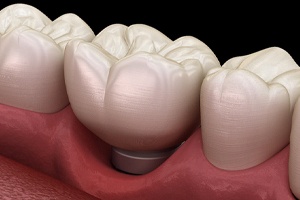
Dental Implant Failure & Salvage – Needham, MA
Preserving Your Renewed Smile

In the vast majority of cases, dental implants in Needham are a successful treatment. However, there is always the small chance that failure can occur. If you ever start to suspect that something is amiss with your replacement teeth, get in touch with us right away. We will assess the situation and do all we can to restore your oral health. Hopefully, we will be able to preserve your implants and allow you to continue enjoying all the benefits they offer.
Why Do Dental Implants Fail?

The most common reason for a failed dental implant in Needham is peri-implantitis, a form of gum disease that attacks the tissue around an implant. Eventually, the infection can become so severe that the gums and bone can no longer the replacement teeth. Poor oral hygiene is often the driving force behind peri-implantitis, but other factors can also contribute to it.
Other possible causes of dental implant failure include injury, underlying medical conditions, and failed osseointegration (failure of an implant to bond with the surrounding bone).
Symptoms of Failed Dental Implants

Dental implant failure can occur soon after the initial surgery, but it can also happen months, years, or decades later. That is why you should always be on the lookout for the following symptoms:
- Difficulty chewing. After you get used to your implants, you should be able to eat virtually anything with ease. Problems in this area indicate the need to visit your dentist.
- After you heal from your initial surgery, your implants should be comfortable in your mouth. Severe, lingering, and unusual pain are all red flags that could point to implant failure.
- Signs of infection. Pus, swelling, red gums, receding gums, and swollen gums are all potential signs of peri-implantitis.
- A loose-feeling implant. In some cases, a loose-feeling implant means that one of your restorations needs to be repaired. In other instances, there is a problem with the implant itself.
How Dental Implant Salvage Works

If one of your implants feels less than healthy, do not expect the problem to go away on its own. Without treatment, it is only likely to get worse. Call our practice, and we will schedule you for an appointment as soon as we can. When you get to our office, we will examine your mouth, perhaps take some scans, and learn more about your symptoms. From there, we will be able to recommend your next steps.
In some instances, we can prevent implant failure with antibiotics or another simple treatment. However, it is also possible that we will have to remove an implant, perform restorative procedures, and place a new implant after your mouth has healed.